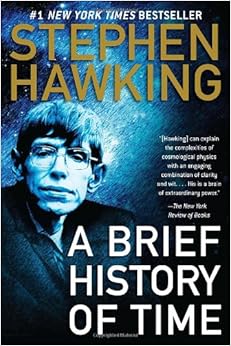Putting aside the issue of God's nature and being, and all the theories about the origins and evolution of the universe, I was still left wondering how the very first bit of matter, whatever it was, could have appeared out of nowhere, out of nothing. I needed to know what the physicists said about it. If not from the hand God, then how do they explain it?

Which is why, this week I tackled Stephen Hawking's "A Brief History of Time."

The book was a #1 New York Times bestseller, implying that it sold thousands of copies. According to the back cover, it "explores such profound questions as: How did the universe begin--and what made its start possible?"
Bingo--just what I was looking for. It promised to explore concepts like black holes and quarks, antimatter, the big bang, and the question of God "in language we can all understand."
I beg to differ.
 |
| www.pixgood.com |
I barely understood a word of it even though I've taken courses in physics and calculus. I mean, I understand the fact that when we observe the night sky we are seeing it as it was millions of years ago because it takes that long for light from the stars to reach us. It makes sense to me that if you could travel faster than the speed of light you would go back in time.
But Hawking lost me when he said that time is subject to the pull of gravity. It passes more slowly the closer you are to a large mass such as a planet. Meaning that if you took twins at birth and raised one of them on the top of a mountain and raised the other one on the valley floor, the twin on the mountain top would age more quickly. Paradoxically, if you sent him off into space at nearly the speed of light, he would age more slowly than the twin he left behind, and would be much younger when he returned. Because time and space are relative. Or something like that. Theoretically.
I really got hung up when he explained that light is subject to gravitational forces. Black holes are formed when the gravitational pull of a massive star bends light and attracts it with such force that none of the light can escape. So we can't see the star anymore because its light can't reach us, but we know it's there because of its gravitational pull on other objects in the universe.
| www.cosmos4kids.com |
He talked about antiparticles, event horizons, singularities, pulsars, imaginary time, quantum mechanics, wormholes, and string theory. He described these concepts without burdening the reader with the mathematical formulas that prove them. I don't even want to go there...
This is impossible...
 |
| www.entertainingchristianity.com |
I don't know how many of the people who bought this book read it. I can't imagine many of them understood what they read. I bow down to anyone who did. I still haven't decided whether I think theoretical physicists are geniuses, or if they are simply delusional.
But then they might think the same of me. I have an aversion to mathematics. Perhaps they have an aversion to writing. They'd think it strange, indeed, that anyone could sit in front of a laptop hour after hour, day after day, for no better reason than to tweak a word or agonize over the proper placement of a comma, and enjoy doing it. Welcome to my life.
 |
| www.clipart.com |
*
"The universe is not required
to be in perfect harmony with human ambition."
~Carl Sagan~
*
Good. We've solved that problem. And I'm ready for the next theoretical storm, due to arrive later today. I have the coffee and cookies, the wine, and plenty of birdseed. Now I just have to decide which book is next, "Wild" or "Adultery," or a little bit of both.
Good. We've solved that problem. And I'm ready for the next theoretical storm, due to arrive later today. I have the coffee and cookies, the wine, and plenty of birdseed. Now I just have to decide which book is next, "Wild" or "Adultery," or a little bit of both.
jan









No comments:
Post a Comment